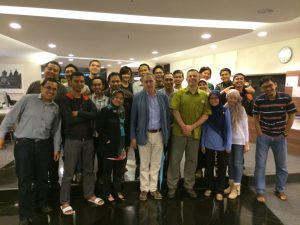Memo #275
By Yves Tiberghien – yves.tiberghien [at] ubc.ca
 Asia is in the midst of a great uplift, but also great social change and geopolitical transformation. In the midst of China’s rise, China-Japan tensions, India’s new voice, and the US pivot, how are Indonesians thinking and planning? Indonesia is only slowly waking up to its new place in the limelight and its new role in the G20. It remains primarily focused on internal transition and stability, as well as on ASEAN and its extensions (such as the East Asia Summit and the Regional Comprehensive Economic Partnership, or RCEP). At the same time, Indonesian policy elites are remarkably confident that they can find a balance between China, Japan, and the US and are optimistic about the future.
Asia is in the midst of a great uplift, but also great social change and geopolitical transformation. In the midst of China’s rise, China-Japan tensions, India’s new voice, and the US pivot, how are Indonesians thinking and planning? Indonesia is only slowly waking up to its new place in the limelight and its new role in the G20. It remains primarily focused on internal transition and stability, as well as on ASEAN and its extensions (such as the East Asia Summit and the Regional Comprehensive Economic Partnership, or RCEP). At the same time, Indonesian policy elites are remarkably confident that they can find a balance between China, Japan, and the US and are optimistic about the future.
In the words of one senior foreign policy adviser, Indonesians receive a lot of attention at the moment from the three great powers and on the global scene. At the School of Governance and Public Policy in Jakarta, 75% of policy students see current geopolitical changes as an opportunity and 80% see the rise of China as a chance for Indonesia. Further, 75% believe that China will contribute positively to global governance over the next decade. Yet, the same policy students are realistic and 80% answer that thus far Japan has had a more positive influence on Indonesia than China. This explains why Indonesia keeps silent about Prime Minister Abe’s visit to Yasukuni and avoids taking sides.
In terms of economic models, nearly 40% of Indonesian policy students see the Chinese model as a positive one for Indonesia, while over 35% see the Nordic or German model as attractive and 30% have positive views about the Korean model. Only 5% see a US-style liberal model as ideal, 5% see the Japanese model as positive and 0% take cues from the Indian model.
Thus, Indonesia occupies an interesting middle space in Asia: slowly awaking to its new stardom on the global stage. Proud of its culture and democratic transition, and confident about the ASEAN model, it is preparing for the potential role of middle power and as the incubator of a new development pathway.
About the Author:
Yves Tiberghien is the Director of the Institute of Asian Research and Associate Professor of Political Science at the University of British Columbia; Executive Director of the China Council, and a Senior Fellow with the Global Summitry Project at the Munk School, University of Toronto.
-
Links:
- Anthony Reid (ed.), Indonesia Rising (2012)
- Karen Brooks, “Six Markets to Watch: Indonesia and the Philippines,” Foreign Affairs 93(1), 2014
- Global Asia, Special Issue: “An Emerging Giant: The Sense and Sensibility in Indonesia,” 2013
Related Memos:
See our other memos on Indonesia.

Comments are closed, but trackbacks and pingbacks are open.